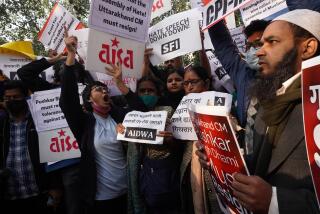Entertainment : Hindu-Muslim Love in Movie Is Hot Topic
- Share via
NEW DELHI — The movie’s theme is forbidden love, with the Romeo a Hindu newspaper journalist and Juliet the daughter of a Muslim brick maker.
Their cross-denominational passion is one reason “Bombay” has become one of India’s most controversial films.
The Censor Board held up the film’s release for a month and a half. Once the movie was out, the police commissioner in Hyderabad ordered it withdrawn from 15 theaters. New Delhi posted a heavy police presence for its opening there last Friday. Bombay’s police chief delayed its release for a week, until today, and Muslim teen-agers in neighboring Thane stoned cars to protest the film.
And Indians, both angry and approving, have written to newspapers.
Taboo love theme aside, “Bombay” is kindling such passions because it takes on a historical event still fresh in people’s minds. The film’s closing half deals with the 1992 and 1993 communal riots in Bombay, in which 600 people, mostly Muslims, were slaughtered.
That savagery, which local and national authorities did little to halt, followed the razing of a mosque at Ayodhya in northern India by Hindu zealots in December, 1992. The incidents are a troubling reminder that, nearly half a century after the trauma of India’s partition, Muslims and Hindus could still hate and attack each other because of their religious differences.
After a number of leading Bombay Muslims were shown director Mani Ratnam’s latest production at a special screening, they objected that the film contained “anti-Islamic” scenes and threatened to picket movie houses.
In one of many scenes that the Muslim leaders want deleted, the heroine, played by actress Manisha Koirala of Nepal, has her veil removed by her lover, South Indian heartthrob Arvind Swamy.
The two characters end up marrying and having twins, but their families object. “You are a Hindu. We are Muslims,” Koirala’s father tells the hopeful suitor Swamy, who is attacked and driven away. “Our blood will never mingle.”
The new release coincides with a political earthquake in Bombay and its state, Maharashtra. Last month, the Hindu nationalist coalition Bharatiya Janata won elections in the state, a matter of concern to many Indian Muslims.
An extremist partner in the coalition, Shiv Sena, is headed by Bal Thackeray, a former newspaper cartoonist who has professed admiration for Adolf Hitler. He was furious at Bombay Police Chief Satish Sahney’s postponement of the film’s release and has warned Muslims not to insist on making cuts.
“Muslim fundamentalists should note that today Mahatma (Mohandas K.) Gandhi and Pandit (Jawaharlal) Nehru are not alive to support them,” Thackeray said in a scarcely veiled threat. “How strong you are, how strong we are, that we shall see.”
The Shiv Sena chief minister of Maharashtra said his government will not ask for an extension of the ban on “Bombay.”
Thackeray, a prominent Bombay personality who many Indians believe is responsible for the riots, is portrayed in the film. He was given a special preview.
When the lights came on, Thackeray said one scene was “totally wrong.” It showed him touring Bombay in a car after the riots, then covering his face with his hands and repenting.
“Why should I repent?” Thackeray told Sunday, a Calcutta magazine. “We didn’t start the violence. . . . We had no choice but to retaliate. So how can you show me repenting?” A cut was made to delete the footage.
Dahlburg is a Times staff writer, and Sharma is a special correspondent.
More to Read
Sign up for Essential California
The most important California stories and recommendations in your inbox every morning.
You may occasionally receive promotional content from the Los Angeles Times.










